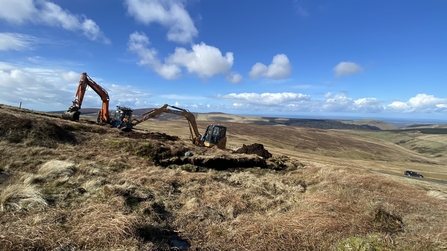Have you noticed local or UK seasonal fruit and vegetables on the shelves? Can you buy interesting local varieties and nature friendly produce? It's not always easy to find, even in peak UK growing seasons.
But you may ask why on earth do the Wildlife Trusts care about horticulture? It occupies such a small amount of land compared to cereals or livestock. There’s not much wildlife in a potato field is there? Yet that potato field could harbour more nature above and below ground, especially if the soil is protected, fewer pesticides are used, and more nature rich habitats could surround it. Our orchards and fruit farms could be rich nature habitats.
Our new report 'Home Grown’, which we’ve jointly produced with the Soil Association and Sustain delves into why we need to care about our fruit and veg production in England.
The reality is that the UK fruit and veg sector is in trouble. It should be supported and expanded so we can all consume fresher produce and growers can invest in wildlife-friendly production. The new government must prioritise this, use the ample evidence and listen to experts including National Food Strategy advisor Hendry Dimbleby calling for more and better and faster especially for children.
A sector in trouble
Many growers fear for the survival of their businesses, especially as our fruit and vegetable consumption has fallen to its lowest level in half a century. Unpredictable weather, low prices, labour issues, and unreasonable demands are driving producers out of business. Public health will be further at risk if these trends continue and production declines even more.
Critically, current production methods are harming wildlife using chemicals, excessive water consumption, and causing the loss of important habitats.
Precious peatlands
Some very special soils in lowland peat areas, like the fens in Lincolnshire, are used to grow a significant proportion of the vegetables, (lettuce, leeks and onions), that we eat. Peatlands are vital nature sites and are home to a
variety of highly specialised species. Despite covering only 10% of UK land area, peatlands are our largest terrestrial carbon store. But after centuries of exploitation, just 20% of the UK’s peatlands are in near-natural condition and now greenhouse gas emissions from lowland peatlands make up 29% of total UK agricultural emissions.
Lowland peat soils have a fine tilth - a perfect growing medium for veg. Yet continuous cultivation means the loss of these carbon and nature rich soils is a disaster for climate and wildlife. Such areas need protecting - not worked hard to produce cosmetically uniform produce at low prices.
The UK Government must invest in farmer-led research to support a phased transition or enable sustainable and nature-friendly methods of farming on peat; including finding crop varieties that can be grown in wetland conditions in paludiculture, or wetter, systems.
Transforming our fruit and vegetable growing sector is vital for our health, climate, and nature.
We need to ensure we can grow more fruit and vegetables everywhere – and do this using sustainable methods that don’t harm the climate, and that work alongside nature using integrated pest management. Growers need to be supported in this period of change and must be treated fairly in the marketplace, through new regulations so that the transition to nature-friendly growing can happen long term.


